Not sure what Daijoubu in Japanese means? Well, check out our article below to learn the meaning of Daijoubu and how to use it.
If you’re learning Japanese or are obsessed with the Japanese entertainment industry then you most probably would have come across the word “Daijoubu”.
It’s a word that’s regularly used in anime, manga, Japanese songs, dramas, and almost every form of Japanese entertainment. But what does the word actually mean?
- Related: Meaning of Ganbatte
- Related: Meaning of Thumbs Up in Japan
If Daijoubu is a Japanese term that’s used frequently then it has to be something important. To let you know what the word Daijoubu means and how it should be used we’ve brought you a thorough analysis down below. Make sure to read the entire article to know everything about Daijoubu.
What Is Meaning Of Daijoubu
Daijoubu in Japanese is written as だいじょうぶ and in the English language it can mean “Okay”. However, the word Daijoubu doesn’t have a single literal meaning and can have several meanings and a lot of expressions.
The flexibility of Daijoubu makes the word an adjective, an adverb and it can even be used as an expression of gratitude, compliance, and rejection.
For example - As an adjective, Daijoubu can mean “Everything Is Normal”, “I’m Okay” or “All Is Fine”. Similarly, as an adverb, Daijoubu can be used to let the other person know that you’ve understood them and everything is fine and you have no doubts regarding any matter.
Basically, Daijoubu is a word or an expression to convey that “Everything Is Perfectly Okay”.
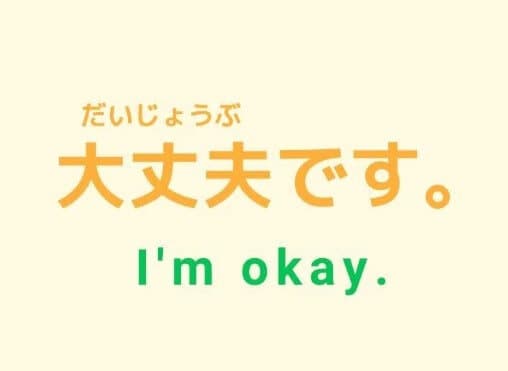
When it comes to showing someone gratitude, the Japanese people tend to use “Daijoubu” to say “Thank You No Problem”. The same word in Japanese can also be used to reject an offer from someone as well.
For instance, if you’re offered a drink from someone and you don’t want it, you can simply reject the offer by saying “Daijoubu” in Japanese which in this context it means “No, Thank You”.
Besides thanking and rejecting, the word Daijoubu can even be used to express your compliance with something. The usual example of this is when parents insist their children do a certain activity and the children generally say “Daijoubu” which means “Okay” in this context.
The word Daijoubu is also used in other circumstances like when a boss asks the employees to perform a task and the employees comply by saying “Daijoubu” which means “Okay” or “Alright”.
How To Pronounce Daijoubu?
Before we get to the part where we learn how and when to use the term Daijoubu, it’s best we learn how to pronounce it. Trust me, you don’t want to mispronounce the word when conversing with a Japanese person because the person might not understand what you actually wanted to convey.
Daijoubu is pronounced as “dhai - jo - bu”. The “D” in Daijoubu mustn’t be emphasized and should be rather pronounced with a light sound like “dhai”. The “Jou” in Daijoubu is actually pronounced as “jo” because the “U” is silent and it should not be pronounced as “jou” or “jow”.
Last but not the least, you pronounce “Bu” in Daijoubu as it is without dragging the “U” too much.
When And How To Use Daijoubu?
Now it’s time to find out how and when the word Daijoubu should be used. Keep in mind that Daijoubu can be used in both questions and answers as well. Let’s take a look at some real-life scenarios that are ideal for the usage of the word Daijoubu.
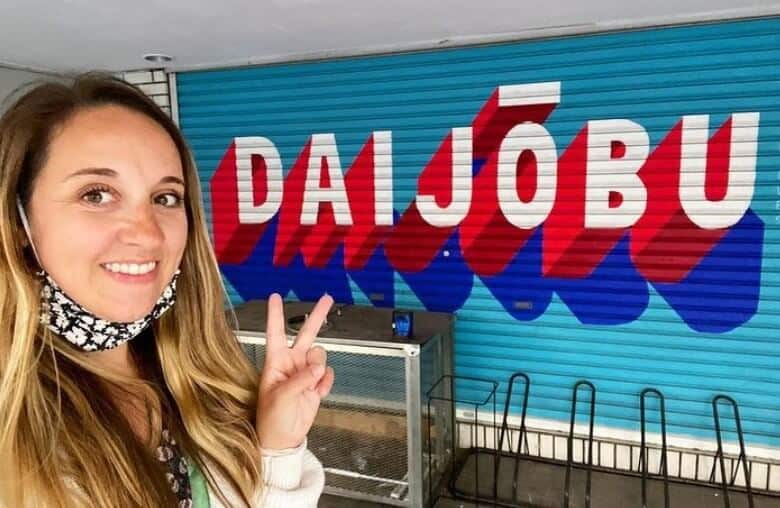
- When Asking If Everything Is Okay - One of the most formal questions you can ask a person is if they’re fine or if everything is okay with them. The question in Japanese would be 大丈夫ですか which is pronounced as “daijoubu desu ka” and this means “Are you okay”? The reply to this question will be うん、大丈夫です which is pronounced as “daijoubu desu” which means “Yes, I’m Okay”.
- When Requesting Someone - Daijoubu can also be used when you’re making a request to someone. For example, if you see someone with a cute pet and you can’t help but want to take a picture of it you can ask them 写真を撮っても大丈夫ですか which is pronounced as “Shashin o totte mo daijōbu desuka” and this means “Is it okay if I take a picture”?
If they’re alright with it then they would probably reply はい、大丈夫です “Hai, Daijoubu desu” which means “Yes it’s fine”.
- When Rejecting An Offer - It’s even easier to express your rejection in Japanese and all you have to do is use Daijoubu. When someone offers you a drink at a party or if you happen to come across a salesman requesting you to make a purchase you can simply say no to them without sounding rude.
The ideal way to reply to them would be いいえ、大丈夫です which is pronounced as “ie, daijōbu desu” and this means “No, I’m fine”.
- When Following Orders - Saying Yes and Okay are very frequent at home and in the fields of work. Daijoubu can be used by employees to reply to their boss after they’ve been given orders. For example, the boss can ask their employee if they’ll be ready to work overnight and if the employees agree to it they can just say はい、大丈夫です “Hai daijoubu desu” which means “Yes, I’m okay with it”.
Another scenario would be parents asking their children to help them or teachers asking their students to perform activities. The usual reply for such scenarios would be はい大丈夫 which is pronounced as “Hai daijoubu” and this means “Yes, okay”.
What Is The Meaning Of Daijoubu Desu?
We now know that Daijoubu means “okay”, “I'm fine”, “it’s alright”, and basically any expression that ensures that there’s no issue and everything is alright. But what does Daijoubu desu mean? And does it mean the same as Daijoubu?
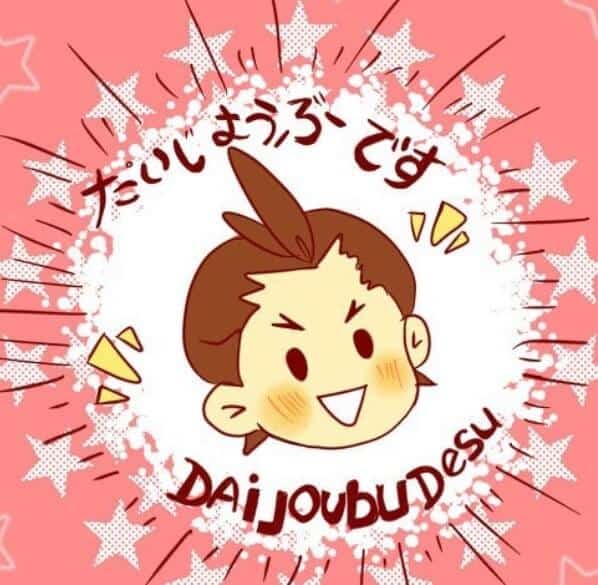
We have a simple answer to all the questions related to Daijoubu desu. Both Daijoubu and Daijoubu desu mean “Everything is okay” only the latter is more professional and formal. If you want to sound more fluent in Japanese then you can use Daijoubu desu.
While Daijoubu can mean okay, Daijoubu desu can mean “It’s fine” or “No, problem”. Regardless, both Daijoubu and Daijoubu desu have the same meanings.
Is It Daijoubu Or Daijoubu Desu?
Many non-Japanese speakers or beginners in learning the Japanese language are faced with the dilemma if they should use just Daijoubu or Daijoubu desu.
Although both phrases mean the same, there are certain occasions one may seem more fitting than the other. Therefore, let’s learn which phrase would be most suitable depending on the circumstances.
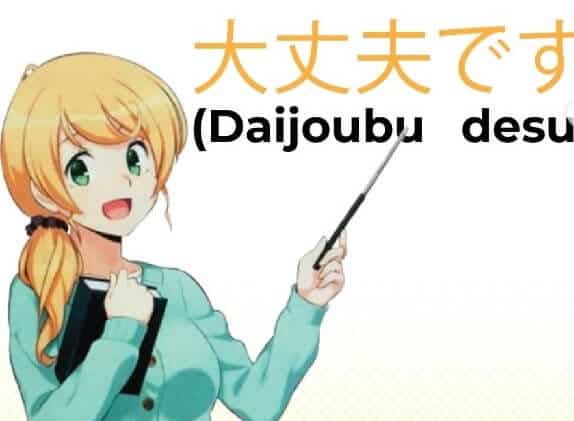
Daijoubu is ideal when you’re using it with friends and family. Since Daijoubu is a flexible and informal word your friends and family members would understand what you’re actually trying to say.
On the other hand, Daijoubu desu is used on formal occasions especially when you’re at work or school. This is because Daijoubu desu can either mean “Yes, please” or “No, please” and please is a common word used for formal instances.
In addition, if you also want to sound more fluent and professional in Japanese you can opt to use Daijoubu desu instead of Daijoubu.
Different Ways Of Saying Daijoubu
In the English language, we have multiple words that can substitute for saying Okay and Yes such as “Alright”, “Sure”, “Of Course”, etc. Similarly, in the Japanese language, there are quite a couple of alternative words for Daijoubu.
We already came across Daijoubu desu which is another word for Daijoubu, a more formal and respectful version.
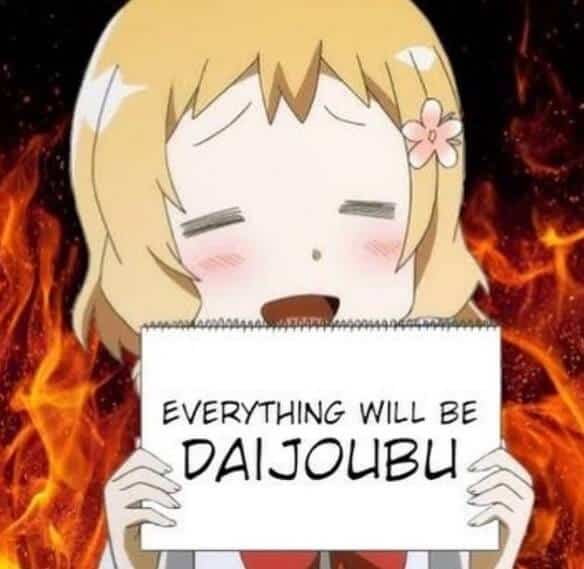
Other words in Japanese that can be used as an alternative for Daijoubu are:
- Wakatta (わかった) - Okay
- Iidesu (良いです) - Okay
- Mondainishi (問題なし) - No problem
- Daijobu dayo (大丈夫だよ) - It’s fine
- Ie kekkodesu - (いいえ、結構です) - No, thank you
These words can be substituted instead of Daijoubu if you want to sound more formal and fluent in Japanese. They can also come in handy when you want to avoid overusing the word Daijoubu.
Is Daijoubu Overused?
A flexible word like Daijoubou which means Okay and Alright makes it a word that can be used on a daily basis. This is because almost everyone answers a question or says words like Okay regularly.
Even the Japanese people like to simply answer their questions with a single word like Daijoubu.
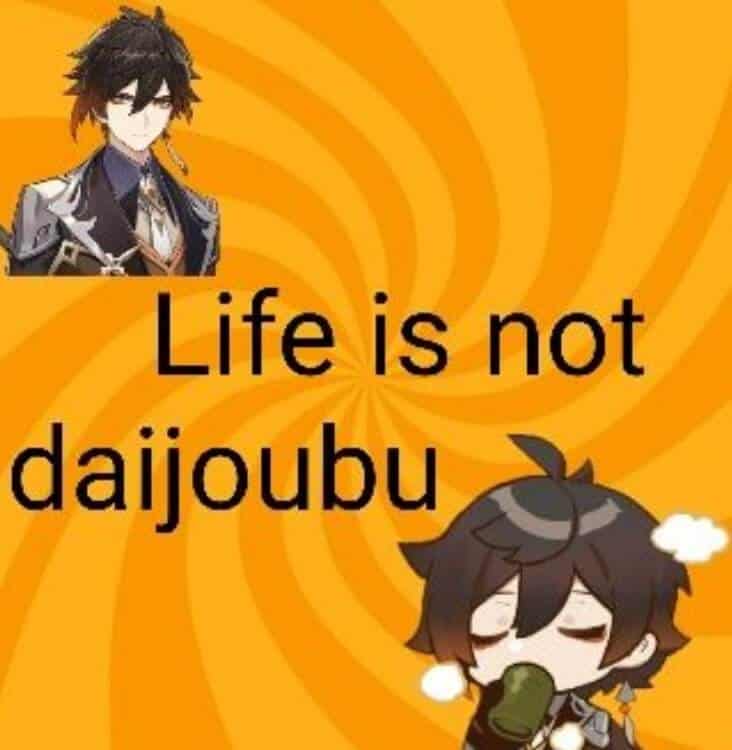
However, it’s gotten to the point that the word Daijoubu has become an overly used phrase to answer any simple question. Although there are few other words in Japanese that can mean okay, it’s still Daijoubou that most people prefer to use due to its popularity.
Meaning Of Daijoubu And How To Use It: FAQs
What does Daijoubu mean?
Does Daijoubu mean are you okay?
How do you say Daijoubu?
Also Read



